七年级英语下册Unit12Whatdidyoudolastweekend短语语法知识点汇总新版人教新目标版
人教版英语七年级下册 短语句型知识点总结 Unit12 What did you do last weekend

Unit12 What did you do last weekend?◆短语归纳1. do my homework 做我的家庭作业2. go to cinema 去看电影3. go boating / camping 去划船/ 去野营4. play badminton 打羽毛球5. on Saturday morning 在星期六早上6. work as 以……身份而工作7. have a good weekend 周末过得愉快8. kind of 有点儿9. stay up late 熬夜10. run away 跑开11. shout at 对……大声叫嚷12. fly a kite 放风筝13. high school 中学14. put up 搭起,举起15. in the countryside 在乡下16. get a surprise 吃惊17. make a fire 生火18. each other 互相19. so… that… 如此……以至于……20. go to sleep 入睡21. the next morning 第二天早上22. look out of…向……外看23. shout to 冲……喊叫;呼唤24. up and down 上上下下25. wake…up 把……弄醒26. move into… 移进……27. a swimming pool 一个游泳池28. camp by the lake 在湖边露营29. go to the beach 去海滩30. the National History Museum 国家历史博物馆31. tell sb about sth 告诉某人关于某事32. living habit 生活习惯33. lose things 丢东西34. play with sb 和某人玩35. have so much fun 玩得很开心、过得很愉快36. shout at sb 对某人大声喊、呵斥某人37. learn the second language 学习第二种语言38. go to the mountains 去爬山39. study for the test 为考试而学习40. have dinner with sb 和某人一起吃晚饭41. swimming pool 游泳池42. be afraid of ... 害怕......43. climb onto one’s back 爬到某人背上44. take a long bus ride to... 乘坐长途公共汽车去....45. keep sb warm 使某人保暖46. cook food on the fire烧饭、做饭47. so...that... 如此......以至于...... 48. look out of ...向......外看49. know about知道、了解50. jump up and down 上蹦下跳51. feel sb /sth doing 感觉某人/某物在做某事52. go near sb/sth 靠近某人/物53. learn from ... 向......学习;从...中汲取54. a useful lesson 有用的一课◆不规则动词的过去式◆用法集萃1. go + doing 去做某事2. play + 球类玩……球3. 时间段+ ago ……前4. keep + sb. / sth. + 形容词/ 副词/ 介词短语使……保持……5. so + 形容词/ 副词+ that 句子如此……以至于……6. see sb. doing sth. 看见某人正在做某事7. let sb. do sth. 让某人做某事8. start to do / doing sth. 开始做某事◆典句必背1. —What did you do last weekend? 上个周末你做什么了?—I did my homework. / We went boating. 我做了我的家庭作业。
七年级英语下册Unit12Whatdidyoudolastweekend之主要知识点
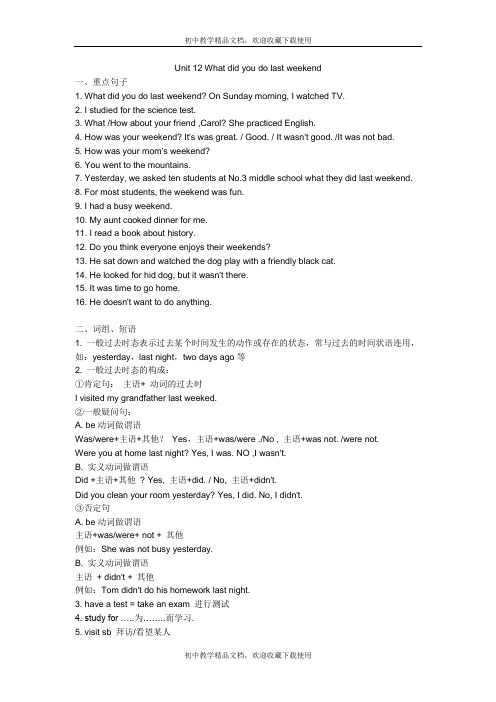
Unit 12 What did you do last weekend一、重点句子1. What did you do last weekend? On Sunday morning, I watched TV.2. I studied for the science test.3. What /How about your friend ,Carol? She practiced English.4. How was your weekend? It's was great. / Good. / It wasn't good. /It was not bad.5. How was your mom's weekend?6. You went to the mountains.7. Yesterday, we asked ten students at No.3 middle school what they did last weekend.8. For most students, the weekend was fun.9. I had a busy weekend.10. My aunt cooked dinner for me.11. I read a book about history.12. Do you think everyone enjoys their weekends?13. He sat down and watched the dog play with a friendly black cat.14. He looked for hid dog, but it wasn't there.15. It was time to go home.16. He doesn't want to do anything.二、词组、短语1. 一般过去时态表示过去某个时间发生的动作或存在的状态,常与过去的时间状语连用,如:yesterday,last night,two days ago等2. 一般过去时态的构成:①肯定句:主语+ 动词的过去时I visited my grandfather last weeked.②一般疑问句:A. be动词做谓语Was/were+主语+其他?Yes,主语+was/were ./No , 主语+was not. /were not.Were you at home last night? Yes, I was. NO ,I wasn't.B. 实义动词做谓语Did +主语+其他? Yes, 主语+did. / No, 主语+didn't.Did you clean your room yesterday? Yes, I did. No, I didn't.③否定句A. be动词做谓语主语+was/were+ not + 其他例如:She was not busy yesterday.B. 实义动词做谓语主语+ didn't + 其他例如:Tom didn't do his homework last night.3. have a test = take an exam 进行测试4. study for …..为……..而学习.5. visit sb 拜访/看望某人6. go to + 目的地go to Beijing去北京go home回家go there到那儿go here 到这儿注意:home,there,here是副词,副词前不加任何介词。
七年级英语下册Unit12Whatdidyoudolastweekend重点单词及句型背诵默写
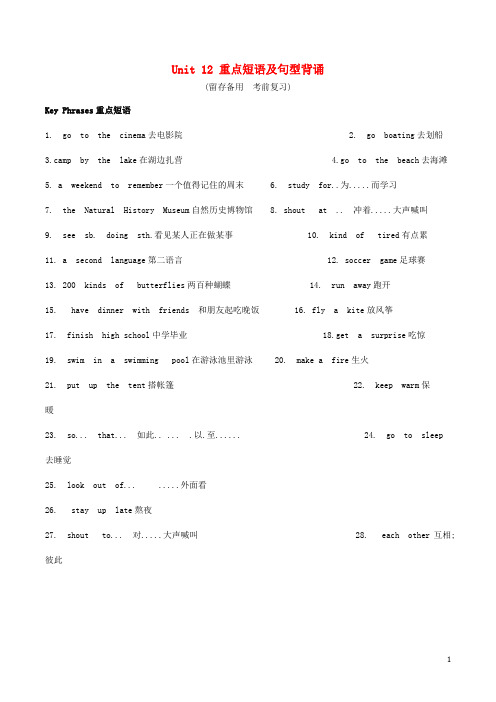
Unit 12 重点短语及句型背诵(留存备用考前复习)Key Phrases重点短语1. go to the cinema去电影院2. go boating去划船3.camp by the lake在湖边扎营4.go to the beach去海滩5. a weekend to remember一个值得记住的周末6. study for..为.....而学习7. the Natural History Museum自然历史博物馆 8. shout at .. 冲着.....大声喊叫9. see sb. doing sth.看见某人正在做某事 10. kind of tired有点累11. a second language第二语言12. soccer game足球赛13. 200 kinds of butterflies两百种蝴蝶 14. run away跑开15. have dinner with friends 和朋友起吃晚饭 16. fly a kite放风筝17. finish high school中学毕业 18.get a surprise吃惊19. swim in a swimming pool在游泳池里游泳 20. make a fire生火21. put up the tent搭帐篷 22. keep warm保暖23. so... that... 如此.. ... .以.至...... 24. go to sleep去睡觉25. look out of... .....外面看26. stay up late熬夜27. shout to... 对.....大声喊叫 28. each other互相;彼此29. play badminton打羽毛球 30. wake... up把... ... 弄醒31. up and down上上下下;起伏 32. go camping野营Key Sentences 重点句型1. What did you do last weekend? 你上周末做了什么?2. How was your weekend? 你周末过得怎样?3.I worked as a guide at the Natural History Museum. 我在自然历史博物馆当过导游。
Unit12Whatdidyoudolastweekend知识点人教版七年级英语下册

Unit12 What did you do last weekend?句子词汇精讲【重点短语】1. last weekend 上周末2. go to the cinema 看电影3. go boating 去划船4. camp by the lake 在湖边露营5. go to the beach 去海滩6. study for the English test 为了英语考试学习7. feed some cows 喂一些奶牛8. work as a guide 做导游工作9. over 200 kinds ofbutterflies 超过200多种蝴蝶10. living habits 生活习惯11. be kind of tired 有点儿累12. stay up 熬夜13.as a special gift 作为一个特殊的礼物14. put up the tents 搭建帐篷15. make a fire 生火16. keep sb. warm 使某人保持温暖17.so...that... 如此…以至于…18. get a surprise 吃惊19. see sb. doing sth. 看见某人正在做某事20. jump up and down 上蹦下跳21. climb onto one’s back 爬到某人背上22. shout at/shout to 大声喊叫23. wake …up 把...弄醒24. a useful lesson 有用的一课1.by the lakeby介词, 意为“在……旁边”,表示位置,相当于beside。
拓展:by作介词的其他常见用法:(1)表示移动方向,意为“经过”。
例如:My mother goes by the building every day. 我妈妈每天从这栋楼旁边经过。
(2)表示方式及手段,意为“用,靠,通过”。
He makes a living by fishing. 他以捕鱼为生。
人教版英语七年级下册单元Unit 12 知识点+测试卷+思维导图

Unit 12 What did you do last weekend?1.重点词汇:lake, beach, sheep, kite, moon, snake, forest, surprise, pretty, natural, shout, fly, stay, move, jump, wake2. 短语归纳:1.work as 以……身份而工作2.have a good weekend 周末过得愉快3.kind of 有点儿4.stay up late 熬夜5.run away 跑开6.shout at 对……大声叫嚷7.put up 搭起,举起8.in the countryside 在乡下9.get a surprise 吃惊10.make a fire 生火11.each other 互相12.so… that… 如此……以至于……13.look out of… 向……外看14.up and down 上上下下15.wake…up 把……弄醒16.move into… 移进……3. 必背典句:1. —What did you do last weekend? 上个周末你做什么了?—I did my homework. / We went boating. 我做了我的家庭作业。
/我们去划船了。
2. —Who visited her grandma? 谁看望了她的奶奶?—Becky did. 贝姬看望了。
3. My sister finished high school two weeks ago. 我的姐姐两周前中学毕业了。
4. But I was so tired that I went to sleep early. 但是我是如此疲倦,以至于我很早就睡着了。
4.语法知识:1. 一般过去时的几种句型:(1)be动词的一般过去时的句型:①肯定句结构为:主语+was / were+其它。
人教版新目标七年级下学期Unit-12--what-did-you-do-last-weekend--知识点

Unit 12 what did you do last weekend?Section A 知识讲解一. last(1)last形容词“最后的,最末的”或者“紧接前面的,刚过去的”。
Today is the last day in the year.最后一天。
I didn’t sleep well last night. 昨晚(2)last副词,“最后地”,I’m the last one.最后一个。
(3)last 动词,“持续,继续,维持”等,The hot weather lasted a week.持续了一周。
二. camp(1)camp 动词,“扎营,搭帐篷”。
We go camping every summer.We walked all day and camped by a river at night.(2)camp 名词,“露营地,度假营”。
Let’s go back to the camp, it’s getting dark. 让我们回营地吧,天黑下来了。
根据汉语提示填空。
(1)When did you join the ______ ______ (夏令营)?(2)I like ______ ______ (去宿营)in the open air.3)We______(宿营)in the forest last night. (4)Let’s go back to the ______(营地)三. sheepsheep 可数名词,“绵羊”,复数还是sheep;goat指山羊。
How many sheep are there on your farm? 你们农场里有多少只羊?拓展:常见的单复数同形的名词还有:deer (鹿),fish (鱼),Chinese (中国人),Japanese(日本人)等。
四. byby介词, “在……旁边”,相当于beside。
Our teacher is sitting by the window.by与交通工具名词连用时,名词前不用冠词,意为“乘、坐、用”等。
七年级英语下册Unit12Whatdidyoudolastweekend知识点
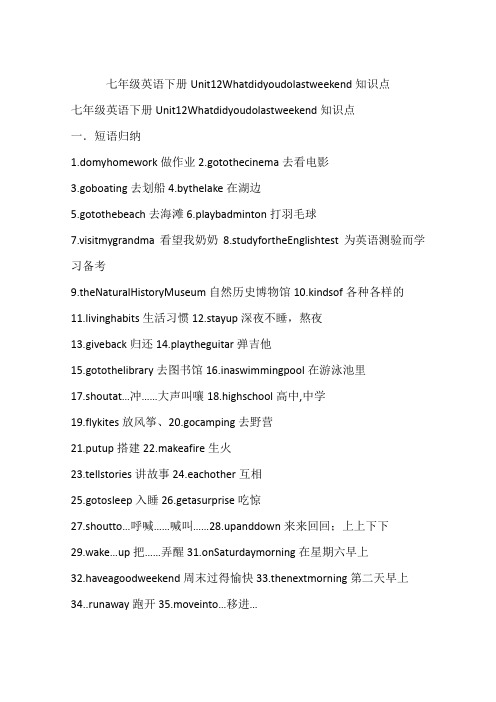
七年级英语下册Unit12Whatdidyoudolastweekend知识点七年级英语下册Unit12Whatdidyoudolastweekend知识点一.短语归纳1.domyhomework做作业2.gotothecinema去看电影3.goboating去划船4.bythelake在湖边5.gotothebeach去海滩6.playbadminton打羽毛球7.visitmygrandma看望我奶奶8.studyfortheEnglishtest为英语测验而学习备考9.theNaturalHistoryMuseum自然历史博物馆10.kindsof各种各样的11.livinghabits生活习惯12.stayup深夜不睡,熬夜13.giveback归还14.playtheguitar弹吉他15.gotothelibrary去图书馆16.inaswimmingpool在游泳池里17.shoutat…冲……大声叫嚷18.highschool高中,中学19.flykites放风筝、20.gocamping去野营21.putup搭建22.makeafire生火23.tellstories讲故事24.eachother互相25.gotosleep入睡26.getasurprise吃惊27.shoutto…呼喊……喊叫……28.upanddown来来回回;上上下下29.wake…up把……弄醒31.onSaturdaymorning在星期六早上32.haveagoodweekend周末过得愉快33.thenextmorning第二天早上34..runaway跑开35.moveinto…移进…二.用法集萃1.go+doing去做某事2.play+球类玩……球3.时间段+ago……前 4.keep+sb./sth.+形容词/副词/介词短语使……保持……5.so+形容词/副词+that句子如此……以至于……6.seesb.doingsth.看见某人正在做某事7.letsb.dosth.让某人做某事8.starttodo/doingsth.开始做某事三.重点句型1.—Whatdidyoudolastweekend?—Ididmyhomework.—上个周末你做了什么了?—我做我的家庭作业了。
unit_12_What_did_you_do_last_weekend?词句精讲精练
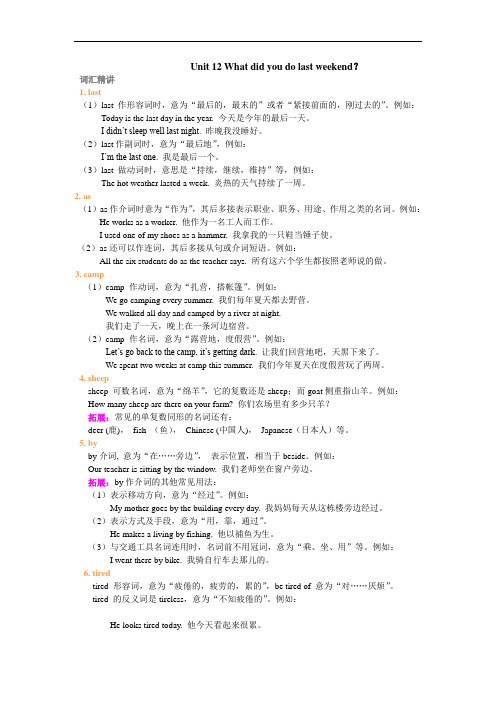
Unit 12 What did you do last weekend?词汇精讲1. last(1)last 作形容词时,意为“最后的,最末的”或者“紧接前面的,刚过去的”。
例如:Today is the last day in the year. 今天是今年的最后一天。
I didn’t sleep well last night. 昨晚我没睡好。
(2)last作副词时,意为“最后地”,例如:I’m the last one. 我是最后一个。
(3)last 做动词时,意思是“持续,继续,维持”等,例如:The hot weather lasted a week. 炎热的天气持续了一周。
2. as(1)as作介词时意为“作为”,其后多接表示职业、职务、用途、作用之类的名词。
例如:He works as a worker. 他作为一名工人而工作。
I used one of my shoes as a hammer. 我拿我的一只鞋当锤子使。
(2)as还可以作连词,其后多接从句或介词短语。
例如:All the six students do as the teacher says. 所有这六个学生都按照老师说的做。
3. camp(1)camp 作动词,意为“扎营,搭帐篷”。
例如:We go camping every summer. 我们每年夏天都去野营。
We walked all day and camped by a river at night.我们走了一天,晚上在一条河边宿营。
(2)camp 作名词,意为“露营地,度假营”。
例如:Let’s go back to the camp, it’s getting dark. 让我们回营地吧,天黑下来了。
We spent two weeks at camp this summer. 我们今年夏天在度假营玩了两周。
4. sheepsheep 可数名词,意为“绵羊”,它的复数还是sheep;而goat侧重指山羊。
最全面人教版七年级下册英语第十二单元知识点归纳总结
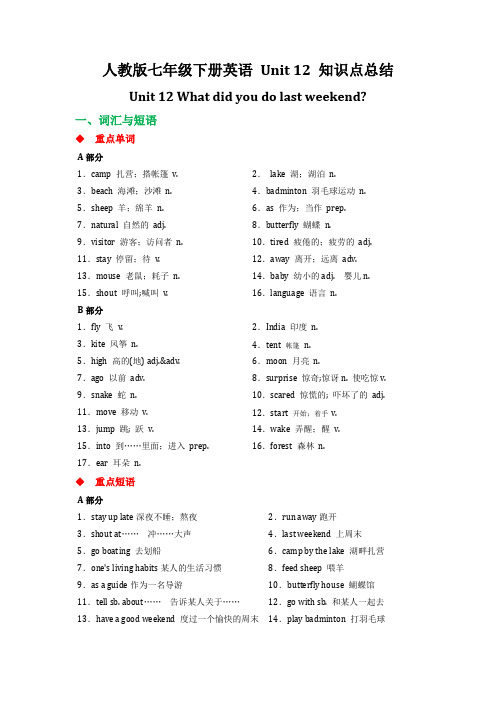
人教版七年级下册英语Unit 12 知识点总结Unit 12 What did you do last weekend? 一、词汇与短语◆重点单词A部分1.camp 扎营;搭帐篷v.2.lake 湖;湖泊n.3.beach 海滩;沙滩n.4.badminton 羽毛球运动n. 5.sheep 羊;绵羊n.6.as 作为;当作prep. 7.natural 自然的adj.8.butterfly 蝴蝶n.9.visitor 游客;访问者n.10.tired 疲倦的;疲劳的adj. 11.stay 停留;待v.12.away 离开;远离adv. 13.mouse 老鼠;耗子n.14.baby 幼小的adj. 婴儿n. 15.shout 呼叫;喊叫v.16.language 语言n.B部分1.fly 飞v.2.India 印度n.3.kite 风筝n.4.tent 帐篷n.5.high 高的(地) adj.&adv.6.moon 月亮n.7.ago 以前adv.8.surprise 惊奇;惊讶n. 使吃惊v. 9.snake 蛇n.10.scared 惊慌的; 吓坏了的adj. 11.move 移动v.12.start 开始;着手v.13.jump 跳; 跃v.14.wake 弄醒;醒v.15.into 到……里面;进入prep.16.forest 森林n.17.ear 耳朵n.◆重点短语A部分1.stay up late深夜不睡;熬夜2.run away跑开3.shout at……冲……大声4.last weekend 上周末5.go boating 去划船6.camp by the lake 湖畔扎营7.one's living habits某人的生活习惯8.feed sheep 喂羊9.as a guide作为一名导游10.butterfly house 蝴蝶馆11.tell sb. about……告诉某人关于……12.go with sb. 和某人一起去13.have a good weekend 度过一个愉快的周末14.play badminton 打羽毛球B部分1.fly a kite 放风筝2.high school 中学3.put up 搭起;举起4.each other 互相;彼此5.get a surprise 吃惊6.shout to……对……大声喊叫7.up and down 上上下下;起伏8.wake……up 把……弄醒9.a special gift 一件特殊的礼物10.take a long bus ride to 乘长途车去11.put up 搭起;举起12.keep sb. warm 使某人暖和13.on the first night 在第一个夜晚14.tell a story 讲故事15.go to sleep 入睡,睡着16.look out of 朝外看17.read a book about…读关于…的书18.know about 知道关于19.start to do sth. 开始做某事20.jump up and down 跳上跳下21.move into 搬进22.make a fire 生火23.something interesting 有趣的事情24.feel……doing sth. 觉得……正在做某事25.finish high school 高中毕业26.see……doing sth. 看见……正在做某事27.clean one's room 打扫房间28.so……that……如此……以至于……29.on Saturday night 在周六晚上30.have dinner with sb.和某人一起吃晚饭31.stay at home 待在家里32.have a busy weekend度过一个繁忙的周末33.talk show 脱口秀34.study for……为……学习◆重点句子A部分1.—What did you do last weekend? 上个周末你做什么了?—I did my homework. 我做我的家庭作业了。
人教版七年级下册英语Unit12What-did-you-do-last-weekend?知识点总结

七下Unit 12 What did you do last weekend?一、Important Phrases:1.go to the cinema 去影院★=go to the movies2.go boating/camping 去划船/野营★summer camp 夏令营3.camp by the lake 在湖边野营★by the pool在池边4.go to the beach 去海滩★on the beach 在沙滩上5.play badminton 打羽毛球play+球类/棋类名词(不加冠词)6. study for the test 备考★test=exam7.feed some sheep/cows喂羊/牛★feed(fed)on...以..为食,feed with...用...喂养8. work as a guide 做导游工作★work as +职业从事某工作9. at the Natural History Museum 自然历史博物馆★nature(n.不可数)大自然-natural(adj.)自然的10. over 200 kinds of butterflies 200多种蝴蝶★over=more than 超过11.living habits 生活习惯★make a living 谋生;eating habits饮食习惯12.kind of tired 有点累★kind of = a little13. stay up late 熬夜★stay at home 待在家,stay away from 远离,lately(adv.)最近地14.sleep early 早睡★sleepy 困的,asleep睡着的15.a family of mice 老鼠一家★mouse(单)-mice(复)16.be afraid of sth./to do 害怕★afraid=scared17.run away 跑开★take away 带走,put...away 把某物收拾好,give away 捐赠18. climb onto one’s back 爬上某人的背19. shout at/to sb.冲某人大叫★shout out 大喊出20. a second language 第二语言★mother tongue 母语21.fly a kite放风筝22.do something interesting 做有趣的事★修饰不定代词,adj.后置:anything special23.finish high school 中学毕业★finish doing sth 完成做某事24.a special gift一特殊礼物★gift=present25.take us to India 带我们去印度26.take a long bus ride 坐很久的公交车27.put up our tents 搭帐篷★put up:搭建,举起,张贴28.make a fire生火29.cook food on the fire 在火上做饭★on an open fire 明火,篝火30.tell cach other stories 互相讲故事★tell a lie 说谎,tell a joke 讲笑话31.keep sb.warm 使某人保持暖和32.sit under the moon 坐在月光下★moonlight月光,moon cake月饼33.so.......that.......如此...以致于...34.get a surprise 吃惊35. look out of...向外看★look out 小心,look for寻找,look after 照顾36. jump up and down 跳上跳下37. move into the forest 进入森林38. wake sb up叫醒某人★wake up醒来,awake醒着的39. read a book about history 读一本历史书★read...to sb给某人读...40.see an interesting talk show 看有趣的脱口秀二、Key Language Points:1.Where did you go last weekend? What did you do last weekend?上周末你去了哪里?上周末你做了什么?一般过去时的特殊疑问句:1)特殊疑问词+did+主语+v.(原)+其他?如疑问词作主语,则陈述语序,如:Who bought you this new dress?谁给你买的新裙子?2)特殊疑问词+was/were+主语+其他?Where were you last night?昨晚你在哪里?2.----Who visited her grandma? -----Becky did.为避免重复,常用do,does,did,so等代替前文提到的内容。
季七年级英语下册 Unit 12 What did you do last weekend课文重难点讲解(无答案)(新版)新人教版
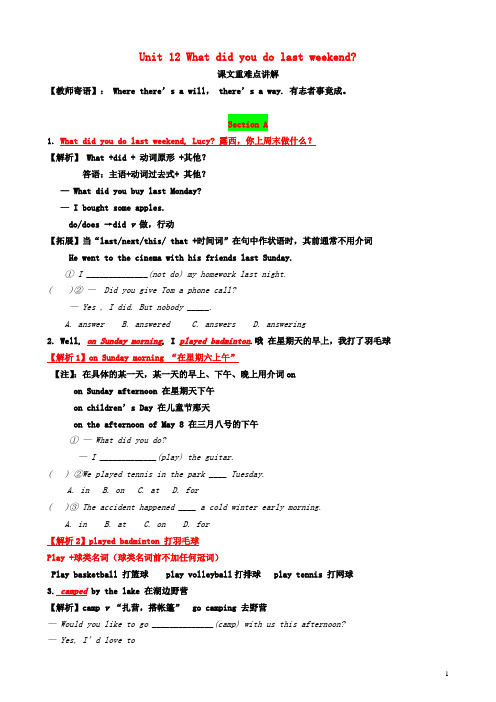
Unit 12 What did you do last weekend?课文重难点讲解【教师寄语】:Where there’s a will,there’s a way. 有志者事竟成。
Section A1. What did you do last weekend, Lucy? 露西,你上周末做什么?【解析】 What +did + 动词原形 +其他?答语:主语+动词过去式+ 其他?— What did you buy last Monday?— I bought some apples.do/does →did v 做,行动【拓展】当“last/next/this/ that +时间词”在句中作状语时,其前通常不用介词He went to the cinema with his friends last Sunday.① I ______________(not do) my homework last night.( )②—Did you give Tom a phone call?— Yes , I did. But nobody _____.A. answerB. answeredC. answersD. answering2. Well, on Sunday morning, I played badminton.哦在星期天的早上,我打了羽毛球【解析1】on Sunday morning “在星期六上午”【注】:在具体的某一天,某一天的早上、下午、晚上用介词onon Sunday afternoon 在星期天下午on children’s Day 在儿童节那天on the afternoon of May 8 在三月八号的下午①— What did you do?— I _____________(play) the guitar.( ) ②We played tennis in the park ____ Tuesday.A. inB. onC. atD. for( )③ The accident happened ____ a cold winter early morning.A. inB. atC. onD. for【解析2】played badminton 打羽毛球Play +球类名词(球类名词前不加任何冠词)Play basketball 打篮球 play volleyball打排球 play tennis 打网球3. camped by the lake 在湖边野营【解析】camp v“扎营,搭帐篷” go camping 去野营— Would you like to go ______________(camp) with us this afternoon?— Yes, I’d love to4. I studied for the math test. 我为数学测验而学习。
Unit 12 What did you do last weekend-知识点整理

Unit 12 What did you do last weekend?知识点整理Unit 12 What did you do last weekend?知识点整理一、重点短语1. play badminton 打羽毛球2. camp by the lake 在湖边野3. gbeach 去海滩4. ga 去电影院5. tell sb. about sth.告诉某人有关...的情况6. stay up 熬夜7. ovan超过;多余 8. fly a kite 放风筝9. run away 逃跑 10. second language 外语11. anythingg注:不定代词+形容词 12. shout to sb. 对某人大声喊叫13. that’s why+从句“那就是为什么......” 14. ta 带领某人去某处15. put u搭建帐篷 16. make a fire 生火us warm 使得我们暖和ght 在头一天夜里19. und在月光下 20. ea互相21. get a terrible surprise 大吃一惊 22. look out of 从......往外看23. know about 知道 24. start to do sth. 开始做某事25. up and down 上上下下 26. wake up 醒来 wake sb. up 叫醒某人27. mov移动进入 28. learned from 从......学到29. stay at home 呆在家里二.重点句型1. —What did you do last week? 你上个星期做了什么事?—I didwork. /We went boating 我做我的作业。
/我们去划船了。
2. —How was your weekend? 你上个星期过得怎样?—Great,thanks. 很好,谢谢。
3. I stayed up late to wagame. 我熬夜到很晚是为了看球赛。
Unit12知识归纳人教版七年级英语下册
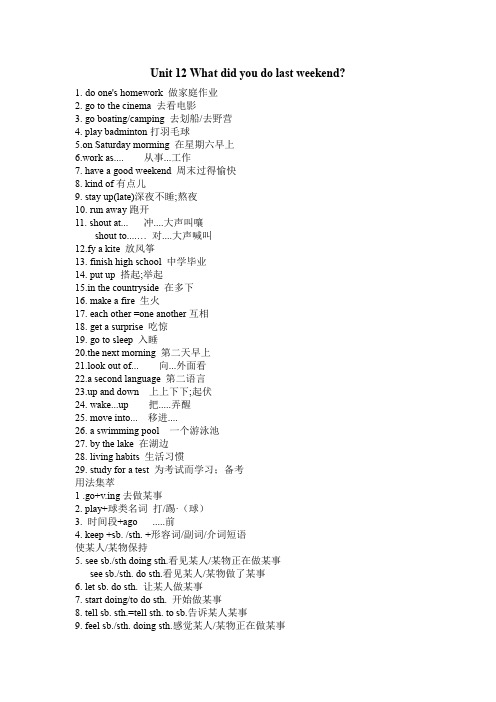
Unit 12 What did you do last weekend?1.do one's homework 做家庭作业2. go to the cinema 去看电影3. go boating/camping 去划船/去野营4. play badminton打羽毛球5.on Saturday morming 在星期六早上6.work as.... 从事...工作7. have a good weekend 周末过得愉快8. kind of有点儿9. stay up(late)深夜不睡;熬夜10. run away跑开11. shout at... 冲....大声叫嚷shout to....… 对....大声喊叫12.fy a kite 放风筝13. finish high school 中学毕业14. put up 搭起;举起15.in the countryside 在多下16. make a fire 生火17. each other =one another互相18. get a surprise 吃惊19. go to sleep 入睡20.the next morning 第二天早上21.look out of... 向...外面看22.a second language 第二语言23.up and down 上上下下;起伏24. wake...up 把.....弄醒25. move into... 移进....26. a swimming pool 一个游泳池27. by the lake 在湖边28. living habits 生活习惯29. study for a test 为考试而学习;备考用法集萃1 .go+v.ing去做某事2. play+球类名词打/踢·(球)3. 时间段+ago .....前4. keep +sb. /sth. +形容词/副词/介词短语使某人/某物保持5.see sb./sth doing sth.看见某人/某物正在做某事see sb./sth. do sth.看见某人/某物做了某事6. let sb. do sth. 让某人做某事7. start doing/to do sth. 开始做某事8. tell sb. sth.=tell sth. to sb.告诉某人某事9. feel sb./sth. doing sth.感觉某人/某物正在做某事feel sb./sth. do sth.感觉某人/某物做了某事10. so+形容词/副词+that.....如此......以至于......11.感叹句①How+ adj./adv.(+主语+谓语+其他)!① What(+ a/an)+ adj. +名词(+主语+谓语+其他)!作文范文:A Busy WeekendI had a busy weekend last week. I spent lots of time doing my homework on Saturday morning. Then I cooked lunch. After lunch, I went shopping and bought lots of food and drinks because it was my birthday the next day. In the evening, my parents and I went to the movies. On Sunday I got up early and cooked breakfast. I went for a picnic with my friends and enjoyed ourselves. In the afternoon, I went to the library and read some interesting books. I listened to some music and watched talk show on TV in the evening. Time passed quickly and I really had a busy but happy weekend.语法填空:1.I can feel the train (move) now.2.The old man (sit) here ten minutes ago.3.This was useful lesson for me.4.They went (camp) last weekend.5.There are a lot of (visit) in Beijing every year.6.They talked about their (live) habits.7.Some (mouse) were in the kitchen.8.(arrive) at school on time, you must get up early.9.There are many (sheep) on the farm.10.I was tired that I went to sleep early.11.You must learn how (call) the fire station.12.I satyed late to watch a soccer game.13. a beautiful girl she is!14.We camped the lake two days ago.15.I worked a guide at the history museum.16.Let me (help) you.17.We started (put) up tents.18.The snake moved the forest.19.Did you (finish) your homework last night?20.It is important (learn) a second language.。
2019人教版七下Unit12 What did you do last weekend 重点知识归纳
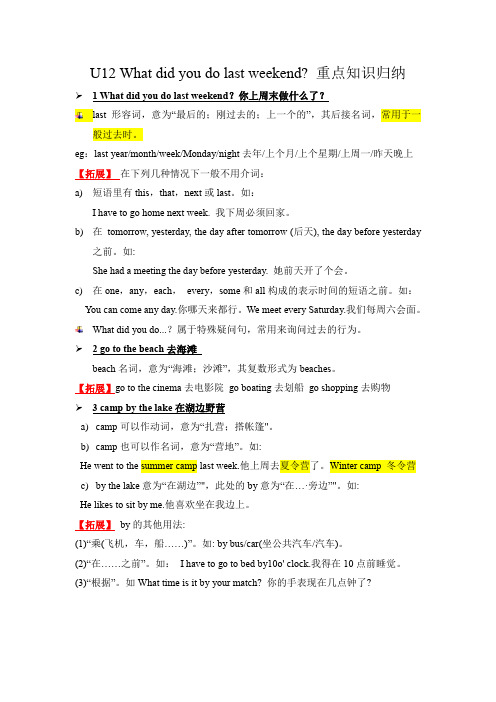
U12 What did you do last weekend? 重点知识归纳1 What did you do last weekend?你上周末做什么了?last形容词,意为“最后的;刚过去的;上一个的”,其后接名词,常用于一般过去时。
eg:last year/month/week/Monday/night去年/上个月/上个星期/上周一/昨天晚上【拓展】在下列几种情况下一般不用介词:a)短语里有this,that,next或last。
如:I have to go home next week. 我下周必须回家。
b)在tomorrow, yesterday, the day after tomorrow (后天), the day before yesterday之前。
如:She had a meeting the day before yesterday. 她前天开了个会。
c)在one,any,each,every,some和all构成的表示时间的短语之前。
如:You can come any day.你哪天来都行。
We meet every Saturday.我们每周六会面。
What did you do...?属于特殊疑问句,常用来询问过去的行为。
2 go to the beach去海滩beach名词,意为“海滩;沙滩”,其复数形式为beaches。
【拓展】go to the cinema去电影院go boating去划船go shopping去购物3 camp by the lake在湖边野营a)camp可以作动词,意为“扎营;搭帐篷"。
b)camp也可以作名词,意为“营地”。
如:He went to the summer camp last week.他上周去夏令营了。
Winter camp 冬令营c)by the lake意为“在湖边”",此处的by意为“在…·旁边”"。
2023年新版新目标英语七年级下册unit12知识点总结

Unit12 What did you do last weekend?Section A1.camp(1)vi 宿营;露营;扎营go camping 去野营camp out 野营露营(2)n.野营;帐篷;营地summer camp 夏令营winter camp 冬令营2.by(1)by+地点名词表方位,在…旁边by the lake/river/tree/window/door by the side of the path.在路边注:表从…旁通过,多与动词go/walk/pass等连用。
(2)by+时间名词到…时(已发生某事),谓语多用完毕时;最晚、不迟于…,在…之前by now/then/this time/next Friday/the end of/three o`clock等。
By the end of last year,another new gymnasium had been completed到去年年终,又有一座新体育馆峻工了。
(3)by+名词表措施、方式、手段等。
A. by+the+可数旳时间、长度、重量等名词。
按…计算,按…买(卖)by the pound/ton/yard/meter/dozen/bale/day/month等。
B. by+表达时间、长度、重量等总称旳不可数名词(名词前不加冠词)。
按…计算,按…买(卖)by time/volume/length/weight/height/depth/width/area等。
C. by+交通工具、交通方式名词(名词前不加冠词,不变复数)。
通过…,由…,乘…by train/rail/tube/taxi/bus/truck/bike/boat/plane;by land/road/sea/water/air等。
(on foot)D. by+抽象名词或具有抽象意义旳一般名词(名词前不加冠词,不变复数)靠…,通过…,由…所致by skill/determination/practice/diligence/inference/chance/accident;by mail/letter/radio/fax/telephone/telegraph/hand/machine等。
七年级下U12What-did-you-do-last-weekend重难点总结
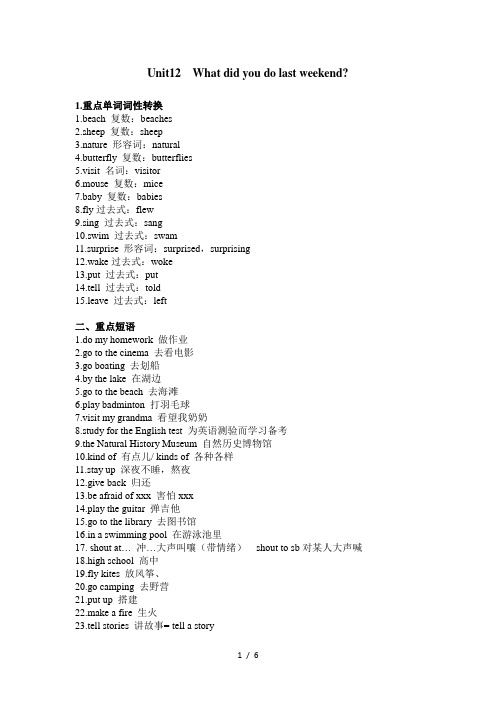
Unit12 What did you do last weekend?1.重点单词词性转换1.beach 复数:beaches2.sheep 复数:sheep3.nature 形容词:natural4.butterfly 复数:butterflies5.visit 名词:visitor6.mouse 复数:mice7.baby 复数:babies8.fly过去式:flew9.sing 过去式:sang10.swim 过去式:swam11.surprise 形容词:surprised,surprising12.wake过去式:woke13.put 过去式:put14.tell 过去式:told15.leave 过去式:left二、重点短语1.do my homework 做作业2.go to the cinema 去看电影3.go boating 去划船4.by the lake 在湖边5.go to the beach 去海滩6.play badminton 打羽毛球7.visit my grandma 看望我奶奶8.study for the English test 为英语测验而学习备考9.the Natural History Museum 自然历史博物馆10.kind of 有点儿/ kinds of 各种各样11.stay up 深夜不睡,熬夜12.give back 归还13.be afraid of xxx 害怕xxx14.play the guitar 弹吉他15.go to the library 去图书馆16.in a swimming pool 在游泳池里17. shout at… 冲…大声叫嚷(带情绪)shout to sb对某人大声喊18.high school 高中19.fly kites 放风筝、20.go camping 去野营21.put up 搭建22.make a fire 生火23.tell stories 讲故事= tell a story24.each other 互相25.go to sleep 入睡26.get a surprise 吃惊27.shout to… 呼喊……喊叫……28.up and down 来来回回;上上下下29.wake…up 把……弄醒30.do my homework 做我的家庭作业31.on Saturday morning 在星期六早上32.have a good weekend 周末过得愉快33.the next morning 第二天早上34.work as 以……身份而工作35.run away 跑开36.move into … 移进……三、重点结构1.go+doing 去做某事2.play+球类玩……球3.时间段+ago ……前4.keep+sb./sth. +形容词/副词/介词短语使……保持……5.so+形容词/副词+that句子如此……以至于……6.see sb. doing sth. 看见某人正在做某事7.let sb. do sth. 让某人做某事8.start to do/doing sth. 开始做某事四、重点句子1.I worked as a guide at the Natural History Museum.我在自然历史博物馆当导游了。
Unit-12-What-did-you-do-last-weekend知识点总结
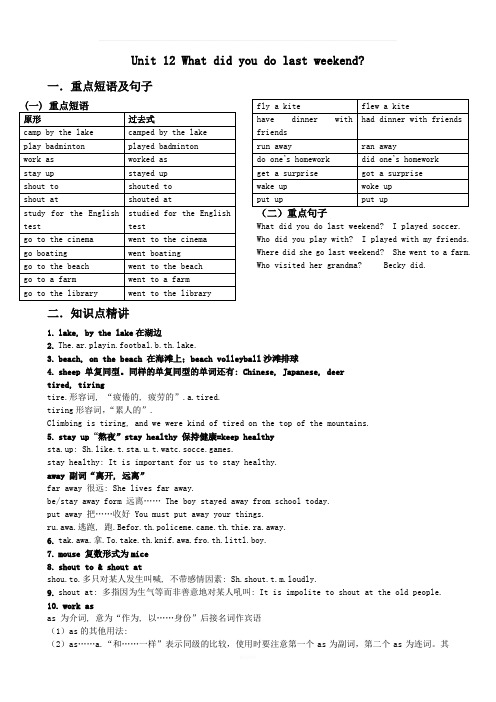
Unit 12 What did you do last weekend? 一.重点短语及句子What did you do last weekend? I played soccer.Who did you play with? I played with my friends.Where did she go last weekend? She went to a farm.Who visited her grandma? Becky did.二.知识点精讲ke, by the lake在湖边ke.3.beach, on the beach 在海滩上;beach volleyball沙滩排球4.sheep 单复同型。
同样的单复同型的单词还有: Chinese, Japanese, deertired, tiringtire.形容词, “疲倦的, 疲劳的”.a.tired.tiring形容词,“累人的”.Climbing is tiring, and we were kind of tired on the top of the mountains.5.stay up “熬夜”stay healthy 保持健康=keep healthysta.up: Sh.like.t.sta.u.t.watc.socce.games.stay healthy: It is important for us to stay healthy.away 副词“离开, 远离”far away 很远: She lives far away.be/stay away form 远离…… The boy stayed away from school today.put away 把……收好 You must put away your things.ru.awa.逃跑, 跑.Befor.th.policeme.came.th.thie.ra.away.6.tak.awa.拿.To.take.th.knif.awa.fro.th.littl.boy.7.mouse 复数形式为mice8.shout to & shout atshou.to.多只对某人发生叫喊, 不带感情因素: Sh.shout.t.m.loudly.9.shout at: 多指因为生气等而非善意地对某人吼叫: It is impolite to shout at the old people.10.work asas 为介词, 意为“作为, 以……身份”后接名词作宾语(1)as的其他用法:(2)as……a.“和……一样”表示同级的比较,使用时要注意第一个as为副词,第二个as为连词。
人教版七年级下册英语 Unit 12 基础知识单词、短语、句子默写版

Unit 12 What did you do lastweekend?A部分重点单词★根据汉语提示默写出下列单词1.扎营;搭帐篷v.2.海滩;沙滩n.3.羊;绵羊n.4.自然的adj.5.游客;访问者n.6.停留;待v.7.老鼠;耗子n.8.呼叫;喊叫v.9.湖;湖泊n.10.羽毛球运动n.11.作为;当作prep. 12.蝴蝶n.13.疲倦的;疲劳的adj.14.离开;远离adv.15.幼小的adj. 婴儿n.16.语言n.★写出下列单词变形1.beach⎼______________(复数)2.butterfly⎼______________(复数)3.baby⎼______________(复数)4.tell⎼______________(过去式)5.two⎼______________(序数词)6.sheep⎼______________(复数)7.mouse⎼______________(复数)8.visit⎼______________(名词)游客9.lose⎼______________(过去式)重点短词★根据汉语提示默写出下列短语1.深夜不睡;熬夜2.冲……大声3.去划船4.某人的生活习惯5.作为一名导游6.告诉某人关于……7.度过一个愉快的周末8.跑开9.上周末10.湖畔扎营11.喂羊12.蝴蝶馆13.和某人一起去14.打羽毛球重点句子★根据汉语提示默写出下列句子1.—上个周末你做什么了?—我做我的家庭作业了。
2.—你好,Lisa, 周末过得怎么样?—好极了,谢谢。
3.—你周末过得愉快吗?—是的,愉快,但我现在有点累,我熬夜看足球赛了。
4.—她和谁一起去的?—她和她的同班同学一起去的。
5.我在自然历史博物馆当了一名导游。
6.它们(博物馆)有一座房子,里面有200多种蝴蝶!7.谁拜访她的祖母了?8.“所以嘛,儿子,那就是学会一门外语很重要的原因,”鼠爸爸回答道。
B部分重点单词★根据汉语提示默写出下列单词1.飞v.2.风筝n. 3.高的(地) adj.&adv.4.以前adv.5.蛇n.6.移动v.7.跳; 跃v.8.到……里面;进入prep.9.耳朵n.10.印度n.11.帐篷n.12.月亮n.13.惊奇;惊讶n. 使吃惊v.14.惊慌的; 吓坏了的adj.15.开始;着手v.16.弄醒;醒v.17.森林n.★写出下列单词变形1.scare⎼______________(形容词)2.up⎼______________(反义词)3.read⎼______________(过去式)4.wake⎼______________(过去式)5.start⎼______________(同义词)6.use⎼______________(形容词)7.fly⎼______________(过去式)8.sit⎼______________(过去式)重点短词★根据汉语提示默写出下列短语1.放风筝2.搭起;举起3.吃惊4.上上下下;起伏5.一件特殊的礼物6.搭起;举起7.在第一个夜晚8.入睡,睡着9.读关于…的书10.开始做某事11.搬进12.有趣的事情13.高中毕业14.打扫房间15.在周六晚上16.待在家里17.脱口秀18.中学19.互相;彼此20.对……大声喊叫21.把……弄醒22.乘长途车去23.使某人暖和24.讲故事25.朝外看26.知道关于27.跳上跳下28.生火29.觉得……正在做某事30.看见……正在做某事31.如此……以至于……32.和某人一起吃晚饭33.度过一个繁忙的周末34.为……学习重点句子★根据汉语提示默写出下列句子1.我的姐姐两周前高中毕业了。
- 1、下载文档前请自行甄别文档内容的完整性,平台不提供额外的编辑、内容补充、找答案等附加服务。
- 2、"仅部分预览"的文档,不可在线预览部分如存在完整性等问题,可反馈申请退款(可完整预览的文档不适用该条件!)。
- 3、如文档侵犯您的权益,请联系客服反馈,我们会尽快为您处理(人工客服工作时间:9:00-18:30)。
Unit 12 What did you do last weekend 一、基础归纳【教材内容解析】Section A1.camped by the lake (P. 67)camp此处用作动词,表示“扎营、搭帐篷”,常用的短语为:go camping“去野营”;camp out“野营、露营”。
Where did you camp last night?They often go camping during summer holidays.The students love camping out during summer holidays.2.I worked as a guide at the Natural History Museum. (P. 68)as此处用作介词,表示“作为、当作”,后接表示职业的名词。
He works as an actor. As a student, you should study hard.3.How interesting! (P. 68)how引导的感叹句的结构为“How+形容词/副词+主语+谓语”。
How beautiful the bird is! How fast Mary runs!【拓展】what引导的感叹句常用的结构有:“What+a/an+形容词+单数可数名词+主语+谓语”或者“What+形容词+可数名词复数/不可数名词+主语+谓语”。
What a beautiful flower! What interesting books these are! What heavy snow it is!4.I told the visitors about them and their living habits. (P. 68)tell sb. about sth.意为“告诉某人关于某事”。
Mary told me about her pet dog. 5....but I’m kind of tired now. (P. 68)kind of表示“有点儿”,相当于a little。
She is kind of fat.6.I stayed up late to watch the soccer game. (P. 68)stay up意为“熬夜”,要表达“为……而熬夜”用stay up for sth.。
I stayed up late for my homework.7.A family of mice were in the kitchen on Saturday morning when they saw a big cat. (P.69)family为集合名词,表示整体,指代家庭整体概念时,谓语动词用单数形式;表示个体,指代家庭成员时,谓语动词用复数形式。
The Green family are watching TV now. The Green family is a big one.8....that’s why it’s important to learn a second language. (P. 69)That’s why...意为“那就是为什么……”,表示结果。
That’s why I didn’t come. I got up late. That’s why I missed the bus.Section B1.flew a kite (P. 70)fly此处用作及物动词,意为“放飞”。
My father helped me to fly the model plane.2.Did you do anything interesting last weekend? (P. 70)形容词修饰不定代词时,放在不定代词后边。
This isn’t anything important.3.There we put up our tents and made a fire to keep us warm and cook food on. (P. 71) (1)put up此处表示“搭建起”,还可以表示“张贴、举起、建造”。
Please put up your hand if you have any question.You’d better put up a notice here.They put up many buildings last year.(2)make a fire意为“生火”。
He went back home and made a fire.4.On the first night, we just sat under the moon and told each other stories.each other意为“互相、彼此”,相当于one another,常用作宾语。
They helped each other. We talked to each other.5.But I was so tired that I went to sleep early. (P. 71)so...that...意为“如此……以至于……”,so是副词,后接形容词和副词,that引导结果状语从句。
He is so young that he can’t look after himself.The boy ran so fast that I couldn’t catch up with him.6.The next morning, my sister and I got a terrible surprise. (P. 71)the next morning表示“第二天早上”,以过去或者将来某个时间为起点的第二天早上;next morning 表示“明天早上”,以现在为起点的第二天早上。
We started the next morning. We will visit him next morning.7.When we looked out of our tent, we saw a big snake sleeping near the fire.①look out“向外看”,若表示“向外看某物”用look out at sth. 若表示“向……外看”用look out of。
Don’t look out of the window in class.② look out还可以表示“小心”,“对……小心”用look out forLook out for the coming bus.8.I was so scared that I couldn’t move. (P. 71)scared用作形容词,表示“惊慌的、吓怕的”,常用的搭配为:be scared of害怕……;be scared to do sth.害怕做某事。
He was scared of snakes.The little girl is scared to cross the road.9.We shouted to our parents to let them know about the danger. (P. 71)shout to sb.意为“对某人大声叫喊”,shout at则表示“因为生气或者愤怒而大喊”。
We shouted to the driver, but he didn’t hear us.Don’t shout at me.10.My dad started to jump and down in their tent. (P. 71)start后常接名词、动词不定式或者动名词作宾语,用法相当于begin。
When shall we start the meeting?Let’s start discussing/to discuss about the next problem.11.This woke the snake up and it moved into the forest near the lake. (P. 71)① wake作不及物动词,表示“醒来”,常同up连用。
He usually wakes up early in the morning.② wake作及物动词,表示“喊醒、叫醒”,常同up连用。
The teacher woke up all the kids for class.12.What an interesting job they have! (P. 72)本句是what引导的感叹句,what引导的感叹句常用的结构有:“What+a/an+形容词+单数可数名词+主语+谓语”或者“What+形容词+可数名词复数/不可数名词+主语+谓语”。
What a beautiful flower!What interesting books these are!What heavy snow it is!【拓展】how引导的感叹句的结构为“How+形容词/副词+主语+谓语”。
How beautiful the bird is!How fast Mary runs!【语法讲解】一般过去时(II)1.一般过去时表示过去某个时间发生的动作或存在的状态,常和表示过去的时间状语连用。
一般过去时也表示过去经常或反复发生的动作。
2.Be动词在一般过去时中的变化:⑴am 和is在一般过去时中变为was。
(was not=wasn’t)⑵are在一般过去时中变为were。
(were not=weren’t)⑶带有was或were的句子,其否定、疑问的变化和is, am, are一样,即否定句在was或were后加not,一般疑问句把was或were放到句首。
3.句中没有be动词的一般过去时的句子否定句:didn’t +动词原形,如:Jim did n’t go home yesterday.一般疑问句:在句首加did,句子中的动词过去式变回原形。
如:Did Jim go home yesterday?特殊疑问句:⑴疑问词+did+主语+动词原形?如: What did Jim do yesterday?⑵疑问词当主语时:疑问词+动词过去式?如:Who went to home yesterday?动词过去式变化规则:1.一般在动词末尾加-ed,如:pull-pulled, cook-cooked2.结尾是e加d,如:taste-tasted3.末尾只有一个元音字母和一个辅音字母的重读闭音节,应双写末尾的辅音字母,再加-ed,如:stop-stopped4.以“辅音字母+y”结尾的,变y为i,再加-ed,如:study-studied5.不规则动词过去式:am,is-was are-were, do-did, see -saw, say-saidgive-gave, get- got, go-went, com e-came, have-had,eat-ate, take-took, run-ran, sing -sang, put-put,make-made, read-read, write-wrote, draw-dr ew, drink-drank,fly-flew, ride-rode, speak-spoke, sweep-swept, buy-boughtswim-swam, sit-sat bring--brought can-co uld cut-cutbecome-became begin-began draw-drew feel-felt find-foundforget-forgot hear-heard keep-kept know-kn ewlearn-learnt (learned)leave-left let-letlose-lostmeet-met read-read sleep-slept speak -spoke take-tookteach-taught tell-told write-wrote wake-wok e think-thought。
